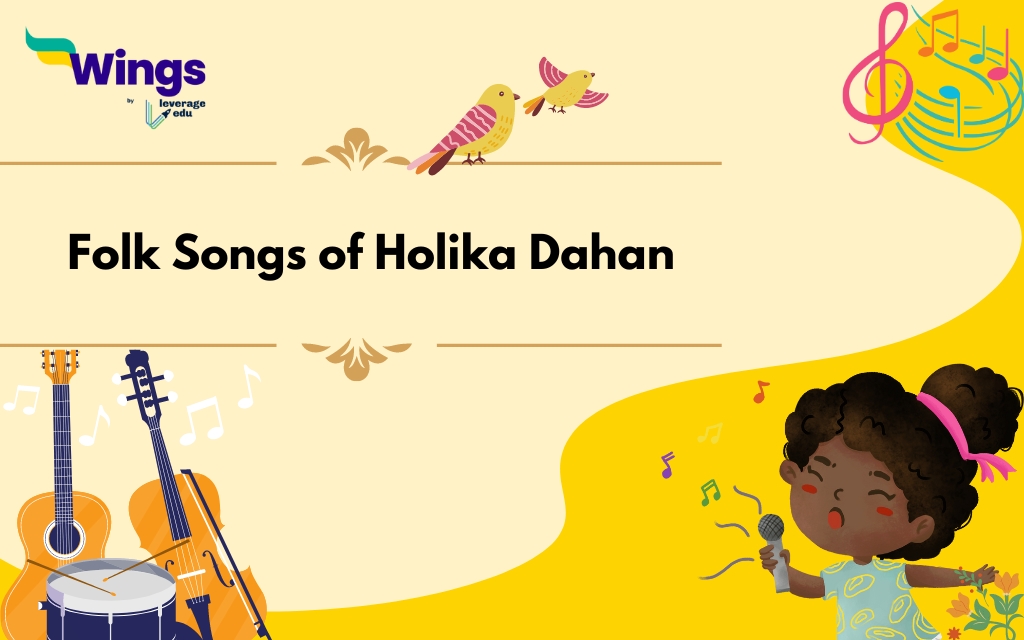Holika Dahan is celebrated to commemorate the triumph of Lord Vishnu over Hiranyakashyap and Holiksa. Holika was a demon who had the blessing of immunity from fire. Hiranyakashyap was an evil king who wanted to kill his son Prahlad because he was a devotee of Lord Vishnu. The king asked his sister Holika to sit with his son on fire and let him burn. To everyone’s surprise, the flames engulfed Holika, and Prahlad was left unscathed. This incident led to the ‘Holika Dahan’ celebrations in different parts of India. On this day, people recreate the burning of Holika and dance to their personalized Bollywood playlist for Holi. Given below are some interesting folk songs that are sung on the eve of Holika Dahan.
Jhumur
This folk performance of Nimdih, Jharkhand, is a celebration of Holika Dahan. People of Nimdih, a city located on the border of Jharkhand and Bengal border, sing and dance to songs in celebration of the victory of good over evil. People celebrate Jhumur by singing folklore and dancing around the fire to celebrate Holika Dahan. These songs are themed around the love between Radha and Krishna. Some of the most popular Jhumur songs are:
- Lal Saluker Ful
- Jhargram Jhumur
- Ekdin Nikunje
- Biraha Basanta
- Ami Jhumur Jhumur
Also Read: Holi Traditions Around the World
Rarh
This is a region of Bengal that covers Medinipur, Birbhum, Bardhaman, and Bankura. This region is marked by beautiful folk songs, rituals, and dances. Rarh folk songs of Holika Dahan signify the red soil and red Palash flowers of the region. Natives of this region celebrate Spring or the ‘Basanta’ festival with the following tunes and songs:
- Tusu
- Jawa
- Bhadu
- Jhumura
Baul
The Baul folk tradition is considered the queen of folk songs. This musical tradition of Bengal celebrates divine love in an extremely simplistic form through its elements of Vaishnavism and Sufism. Bauls spread the spirit of love and togetherness with their songs of Radha and Krishna. All the mystic love in the lyrics of Baul reflects the essence of Holi. People of Bengal and neighbouring areas celebrate Holika Dhawan with the below-mentioned Baul songs:
- Tui Amare Pagal Karli Re
- Kakhan Daaklo Banshi
- Golemale Golemale
- Jonmo Tatto
Also Read: Holi Celebration in Foreign Countries
Baithaki Holi
This Holi tradition is indigenous to the Kumaon region of Uttrakhand. Holi celebration in this region begins with the honouring of the sowing season. In Baithaki Holi, people gather around the pyre on the day of Holika Dahan to sing folk songs on the tunes of local musical instruments. Some of the most enjoyed folk songs of Holika Dahan in the Kumaon region are mentioned below:
- Jhankaro Jhankaro
- Hari Dhare Mukut Khele Hori
- Ram Bhaye Avataar
- Holi Khelat Hain Kailashpati
- Mai Te Dekhi Aayun Nanda ji ki Kunj Galiyan
Phakuwah
Holi is referred to as Phakuwah in Assam. People of this northeastern state of India are drenched in the spirit of Holi for two days. On the first day, natives burn mud huts to celebrate Holika Dahan and play with colours and enjoy delicacies on the second day. On both days, indigenous people sign and listen to the folk music of the spring festival:
- Phagunor Gaan
- Holi Khele Range
- Dhiramoni
- Barpetar Holi Geet
Read: Holi Celebration at Workplace
FAQs
Ans: This day is celebrated a day before Holi. People gather in open places and burn pyres to symbolise the burning of Holika, the symbol of evil. People stand in circles around the pyre to seek the blessings of Lord Vishnu. Everyone applies tilak on each other’s forehead to mark the beginning of the festival of colours.
Ans: Holika Dahan, also known as Choti Holi, is celebrated on the evening of the day before Holi. A pyre resembling the triumph of good over evil is burnt in common places. On the day of Holi, people play with colours and enjoy local sweets and savoury dishes to spread joy and togetherness.
Ans: A plethora of languages are spoken in India and each state has its own folk tradition. Some of the most popular folk songs are Phagunor Gaan and Barpetar Holi Geet in Assam; Tui Amare Pagal Karli Re and Jonmo Tatto in Bengal; and Hari Dhare Mukut Khele Hori and Holi Khelat Hain Kailashpati in Uttrakhand.
Read about more interesting facts about Holi on Leverage Edu. Know about interesting facets of this Indian festival on Facebook, Instagram, LinkedIn, and Twitter.


 One app for all your study abroad needs
One app for all your study abroad needs












 60,000+ students trusted us with their dreams. Take the first step today!
60,000+ students trusted us with their dreams. Take the first step today!